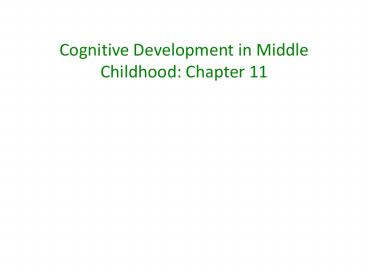Cognitive Development in Middle Childhood: Chapter 11 - PowerPoint PPT Presentation
1 / 21
Title:
Cognitive Development in Middle Childhood: Chapter 11
Description:
Cognitive Development in Middle Childhood: Chapter 11 Piaget s Concrete Operational Stage Developmental change involves progression from a state of equilibrium to a ... – PowerPoint PPT presentation
Number of Views:519
Avg rating:3.0/5.0
Title: Cognitive Development in Middle Childhood: Chapter 11
1
Cognitive Development in Middle Childhood
Chapter 11
2
Piagets Concrete Operational Stage
- Developmental change involves progression from a
state of equilibrium to a state of disequilibrium
- Process of change moves organism from state of
cognitive disequilibrium to a state of cognitive
equilibrium - Assimilationnew information fits within existing
structures - Accommodationnew structures are created or
existing structures are changed to take in new
information
3
Piagets Concrete Operational Stage
- Concrete Operational Thought
- Children can reflect on their own thoughts
- Children attend to dynamic transformations
(processes involved in change) - Childrens mental capabilities change
- Decenterconsider multiple attributes or
dimensions simultaneously - Reversibilitymentally reverse events or actions
- Use logic to make transitive inferences
4
Piagets Concrete Operational Stage
- Limits to Piagets concrete operational child
- Reflective thinking, decentering, and
reversibility are limited to those events
experienced by the child - May underestimate the childs competency with
enriched environment
5
Information Processing Theory (IPT)
- IPT focuses on
- encoding,
- transformation,
- storage, and
- retrieval of information
- Working Memory
- Information currently in active and conscious
processing - Limited duration without rehearsal
- Limited capacity without mnemonic devices
6
IPT Working Memory
- Evidence points to unique processing components
- Verbal
- Auditory
- Executive Control
- Monitoring
- Controlling
7
IPT Depth of Processing Theory
- Shallowattend to surface features, rote
rehearsal - E.g. memorizing names and dates memorizing
definitions - Deepattend to meaningful features, strategic
rehearsal - E.g. summarizing in your own words constructing
a concept map - Overall, deep processing leads to more flexible
and accessible memories
8
IPT Long Term Memory
- Relatively permanent duration
- Relatively (and largely unknown) large capacity
- Organization is based on strategies used during
encoding or processing in Working Memory
9
Network Models of Long Term Storage
- Conceptual nodes
- Represent concepts, facts, or other entities
- Logical arcs
- Represent relationships among conceptual nodes
- Activation of nodes and arcs
- Based on environmental stimulation
- Stream of consciousness
- More frequent activation leads to easier access
and retrieval - More arcs between adjacent nodes and the target
node lead to increased cognitive flexibility
10
Categories of Knowledge in Long-term Memory
- Tulving
- Semantic memoryknowing facts, concepts
- Episodic memoryknowing about events or
activities (maybe a more dominant type of memory
in children - Shank Abelson
- Knowledge of a relatively fixed routine
- Related to episodic memory
- Form default patterns of actions (fast food
restaurant script)
11
Characteristics of Memory
- ConstructiveReconstructive Processing
- Constructive Processing Distortion occurs at
encoding - Reconstructive Processing Distortion occurs at
retrieval - Autobiographical Memory
- Memories for ones own experiences
- Influenced not only by events themselves, but
also how others describe the events to us - Suggestibility (e.g. false memoriesreconstructi
ve and autobiographical)
12
Major Developmental Changes across Middle
Childhood
- Metacognitive skills
- Cognitive monitoring
- Cognitive control
- Cognitive flexibility
- Strategy acquisition, development, and use
13
Major Developmental Changes across Middle
Childhood
- Knowledge base
- Greater number of conceptual nodes
- More efficient organization
- More flexible organization
- More complex networks
14
Cognitive Development in Context (Mathematics)
- Early on, strategies reflect controlled
processing (resource intensive) - With practice and more efficient memory,
strategies reflect more automatic processes (less
resource intensive - Automatic strategies require monitoring that is
based on metacognitive awareness
15
Cognitive Development in Context (Mathematics)
- Mathematics Problems embedded in language and
richer contexts - Strategies include
- Stating the problem
- Solving the computational steps
- Evaluating the outcome
- Restating the results in terms of the original
problem statement - Strategies are likely to be controlled not
automatic
16
Cognitive Development in Context (Literacy)
- Overall, progression is from controlled
processing to automatic at several levels - Phonemic awareness
- Sight words
- Context cues
- Schema-driven knowledge (top-down)
17
Cognitive Development in Context (Literacy)
- Children who
- are told stories,
- have someone read to them regularly,
- have a print rich environment in their lives, and
- have opportunity to explore language
- Singing, Scribbling, Drawing, Invented spelling
- Tend to have more optimistic outcome in literacy
in school - Table 11.3 (pg 393)developmental progression of
reading
18
Cognitive Development in Context (Literacy)
- Developmental process
- Scribbling
- forming pseudo-words with letters,
- invented spelling,
- simple stories and
- narratives based on own experience,
19
Cognitive Development in Context (Literacy)
- Narrative Schema
- Tends to be universal
- Predicable order of elements
- Setting
- Initiating event
- Reaction
- Action
- Consequence
- Moral
20
Cognitive Development in Context (Literacy)
- Narrative
- Structure appears early on
- Nursery tales, childrens stories tend to follow
the structure universally - Children are sensitive to violations of the
structure
21
Cognitive Development in Middle Childhood
- Tends to be a period across cultures of
preparation for more mature roles and
responsibilities - Schooling, in some form, occurs in all cultures
- Fits within Eriksons stage of Industry vs.
Inferiority

